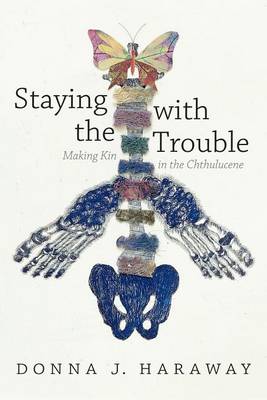9%OFF

Stock image for illustration purposes only - book cover, edition or condition may vary.
Staying with the Trouble: Making Kin in the Chthulucene
Donna J. Haraway
€ 33.99
€ 30.99
FREE Delivery in Ireland
Description for Staying with the Trouble: Making Kin in the Chthulucene
paperback. Donna J. Haraway refigures our current epoch, moving away from the Anthropocene toward the Chthulucene: an epoch in which we stay with the trouble of living and dying on a damaged earth while living with and understanding the nonhuman in complex ways conducive to building more livable futures. Series: Experimental Futures. Num Pages: 312 pages, 31 illustrations, incl. 2 in color. BIC Classification: JFFK; PDR. Category: (G) General (US: Trade). Dimension: 234 x 153 x 19. Weight in Grams: 490.
In the midst of spiraling ecological devastation, multispecies feminist theorist Donna J. Haraway offers provocative new ways to reconfigure our relations to the earth and all its inhabitants. She eschews referring to our current epoch as the Anthropocene, preferring to conceptualize it as what she calls the Chthulucene, as it more aptly and fully describes our epoch as one in which the human and nonhuman are inextricably linked in tentacular practices. The Chthulucene, Haraway explains, requires sym-poiesis, or making-with, rather than auto-poiesis, or self-making. Learning to stay with the trouble of living and dying together on a damaged earth will ... Read more
In the midst of spiraling ecological devastation, multispecies feminist theorist Donna J. Haraway offers provocative new ways to reconfigure our relations to the earth and all its inhabitants. She eschews referring to our current epoch as the Anthropocene, preferring to conceptualize it as what she calls the Chthulucene, as it more aptly and fully describes our epoch as one in which the human and nonhuman are inextricably linked in tentacular practices. The Chthulucene, Haraway explains, requires sym-poiesis, or making-with, rather than auto-poiesis, or self-making. Learning to stay with the trouble of living and dying together on a damaged earth will ... Read more
Product Details
Publisher
Duke University Press
Format
Paperback
Publication date
2016
Series
Experimental Futures
Condition
New
Number of Pages
312
Place of Publication
North Carolina, United States
ISBN
9780822362241
SKU
V9780822362241
Shipping Time
Usually ships in 4 to 8 working days
Ref
99-2
About Donna J. Haraway
Donna J. Haraway is Distinguished Professor Emerita in the History of Consciousness Department at the University of California, Santa Cruz, and the author of several books, most recently, Manifestly Haraway.
Reviews for Staying with the Trouble: Making Kin in the Chthulucene
As always [Haraway's] work is capacious, sharp, inventive, and informed.
Kyla Tompkins
American Quarterly
Haraway's kinships offer a brave opening in feminist theory.... Haraway has a long history of making brave moves-and winning feminism over.
Paulla Ebron and Anna Tsing
Feminist Studies
For anthropologists Haraway's book will read as an ... Read more
Kyla Tompkins
American Quarterly
Haraway's kinships offer a brave opening in feminist theory.... Haraway has a long history of making brave moves-and winning feminism over.
Paulla Ebron and Anna Tsing
Feminist Studies
For anthropologists Haraway's book will read as an ... Read more
